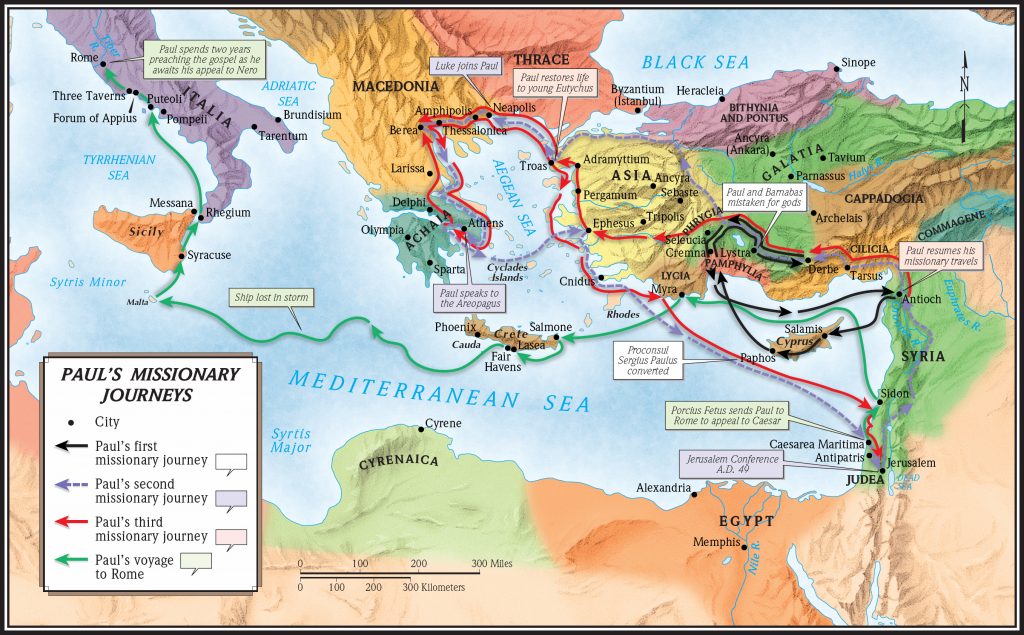The primary reasons for Apostle Paul’s writing to the Romans are diverse and numerous. There are four that appear to carry the most widespread recognition. The main proposals are as follows:
a. Theological Treatise – A theological book recognizing that it is a letter as there is a depth concerning the efficacy of the gospel and its corresponding redemptive path. The letter’s theological meaning is underdeveloped due to the absence of ecclesiological and Christology doctrines. Romans was written predicated upon existing knowledge. This is an occasional letter to work through the implications of justification, sanctification, etc.
b. Missiological Concerns – Centered around the gospel’s progress and its support within the Church. Paul probably wants to make Rome the center of Western Christianity as Antioch is to the Eastern part of the Roman empire. Consequently, some might conclude that Romans is an exhaustive missional support letter.
c. Apologetical – The position that Christianity is a defense at the heart of the Roman empire. As it is said that the book of Romans is principally apologetical, it does not specifically address disputes as such. It has functional elements that are apologetical, but as an occasional letter, the book itself is not principally centered toward that purpose.
d. Pastoral – Conflict in the church is addressed as an occasional matter between the Jew and Gentile. There is a need for healing where the Gentiles and Jews are urged to be messengers of reconciliation within the Church. Paul’s efforts toward the development of unity concerning one people of God by the gospel is the apex of the book of Romans.
In all of Paul’s writing, there are social and cultural concerns about the nature of his work with the gospel of Christ crucified and risen. The assertion Paul makes about “not being ashamed of the gospel” corresponds to his confidence that there was no loss of status, experience, or undue strain due to the gospel’s relevance, necessity, and power. Negativity, opposition, or disputes Paul encountered during his missional pursuits through the gospel had no bearing upon him personally. He didn’t internalize ridicule or slander, nor did he yield to hard or soft persecution when he set himself in association to Christ’s death and resurrection. Any humiliation he may have been expected to endure from socio-cultural pressures didn’t weigh upon Paul to negatively affect what Christ set him apart to do. The development of the church and the discipleship of numerous Gentile believers throughout the Greco-Roman empire was the fruit of his efforts regardless of what cultural conditions were in place about a disgraced messiah perceived by society or the populace.
Paul boasted in the gospel. He proclaimed that “it is the power of God for salvation to everyone who has faith.” Namely, to both the Jew and the Gentile, God’s righteousness is revealed through the faith of those who believe the gospel. As the righteous were to live by faith according to the gospel, the power of God is made evident and salvific toward those who believe. Moreover, the righteousness of God applied to believers who would mock or despise Paul, and followers of Christ were poignantly unwise by comparison as they would remain captive to sin while in a condemned state subject to cumulative wrath of God without mercy. The mercy of God available to those who would accept Christ and His gospel would be the kind of power needed for salvation.
Apostle Paul’s background and conversion had pressing implications about Israel’s election, their rejection, and eventual restoration. Paul wrote in distress about the loss of Israel’s estate (Rom 9:1-3). While it is evident through Scripture that Israel was YHWH’s portion (Deut 32:8-9). They were to become a Kingdom of Priests under the Old Covenant (Ex 19:6), their unbelief about God’s redemptive plan was foretold as a matter of prophetic certainty (Isa. 10:22-23, Hos 1:10, Rom 9:30-33), they would become a people who would become sidelined. The election of YHWH’s people Israel remains an eschatological certainty while their ultimate rejection of the Son of Man revealed as Jesus the Messiah was intentional. To harden the Jews, make them jealous (Rom 11:14), and soften the Gentiles where the Kingdom of God would become filled until the fulness of Gentiles would enter through the gospel (Rom 11:25), the sovereign plan of God was made evident.
While Israel’s unbelief was prophesied, it was ongoing too (Isa. 65:2, Rom 10:21). In paradoxical contrast to Jewish responsibility and the lost condition of Gentiles, the sovereignty of God was at work to produce salvation history. From the fall of humanity and the series of covenants to follow, Jesus the Messiah would shepherd his people, the spiritual seed of Abraham, to the Kingdom of God. In this way, the book of Romans is pastoral as it concerns the redemption of believers, both Jew and Gentile, who represent humanity restored. Most especially the Jews as they are to be saved as a matter of prophetic fulfillment (Isa. 59:21, Jer. 31:33-34, Rom 11:25-32). The pastoral work of God is a celebration of God’s sovereignty as His wisdom and abundant mercy is made clear.
As Paul’s work further made a lasting impact, the biblical world of the Mediterranean and Mesopotamia included coastal cities that emerged as places of incubation in support of early Christianity. The Kingdom of God on Earth was to begin from Jerusalem for the Jew first and then into Samaria, Antioch, throughout Asia Minor and Rome. While Antioch of Syria was the traditional birthplace of Christianity, it was the point of initial operations of Paul, Barnabas, and others to advance the Kingdom from the East. Paul had a base of support to commence his missionary efforts throughout Asia Minor and into Europe, including Macedonia, Achaia, and Rome of Italia.
To achieve Paul’s objectives to reach Spain, a grounding of the Church in Rome was necessary for monetary and resourced support toward the ongoing development of churches in Europe. As Paul exhausted his efforts to plan and develop churches and build a network of support for Christianity present with Jerusalem, Antioch, and smaller communities, he sought to extend his efforts. With an established base in Rome, it was to be a base of operations from the West to reach deeper into Europe. Especially into Spain, the outermost territory of Europe for Paul to complete his appointed work. Antioch from the East, Rome from the West, and Jerusalem to the South were geographical centers of outreach and discipleship to grow the Church. The gospel made its way throughout the biblical world to build momentum by the work of the Spirit and His apostles, where kingdoms of humanity became overlapped of far greater significance by a spiritual empire of Christendom.















